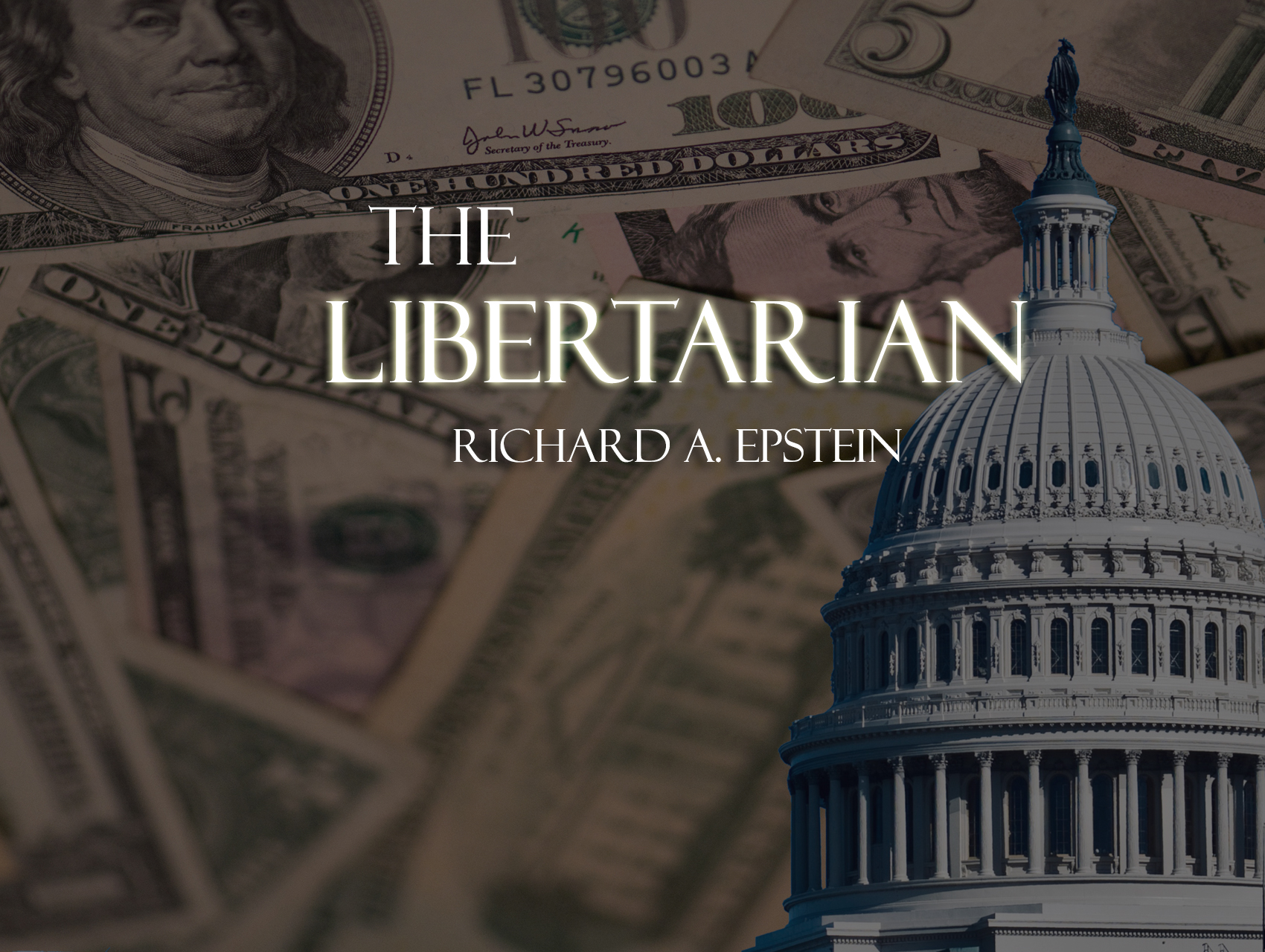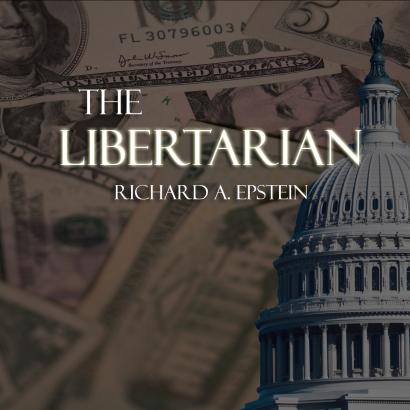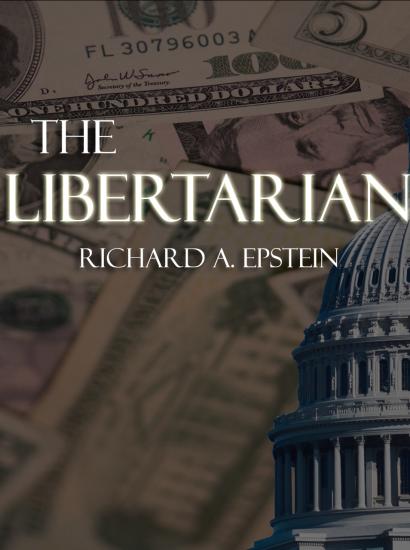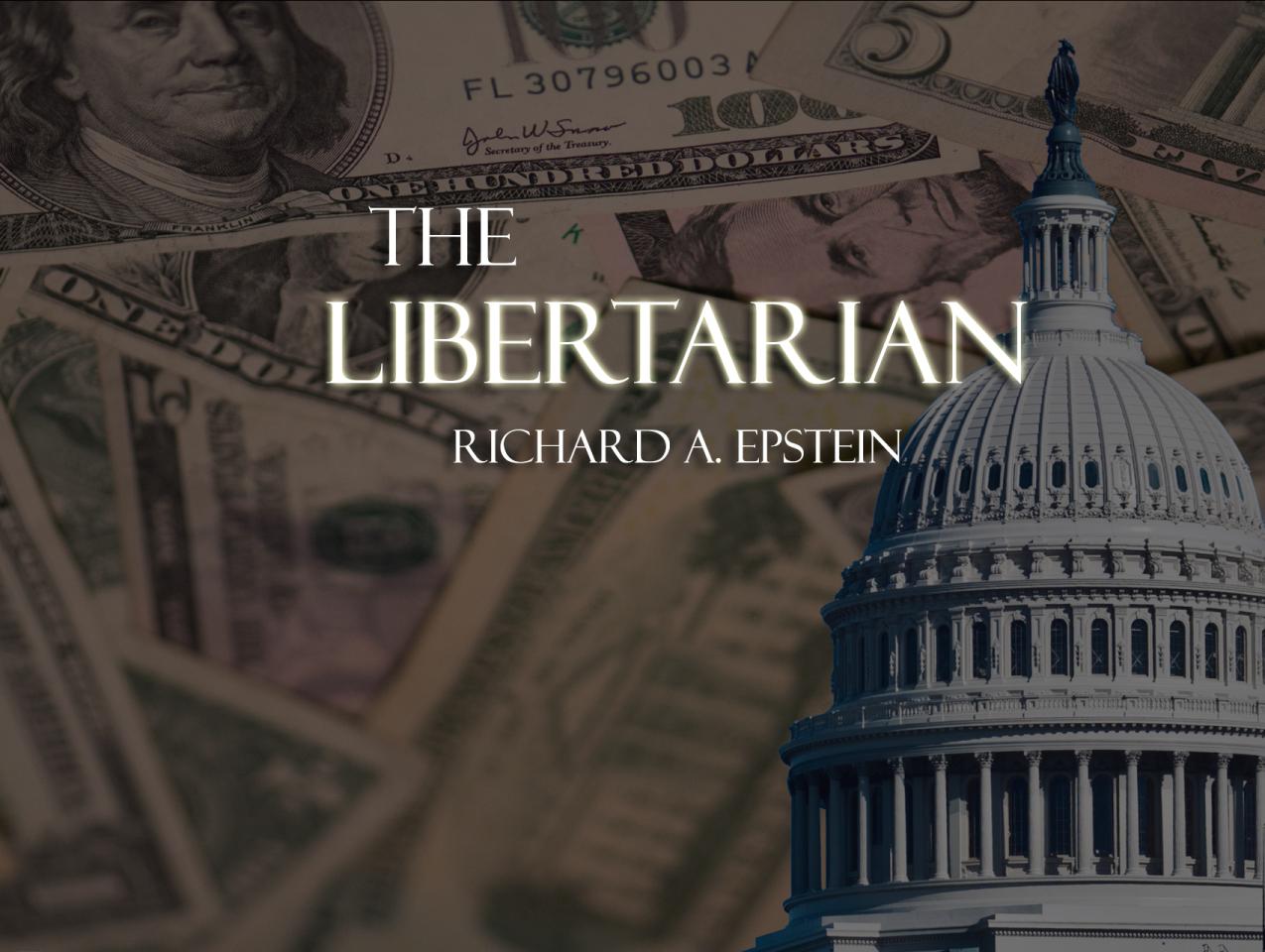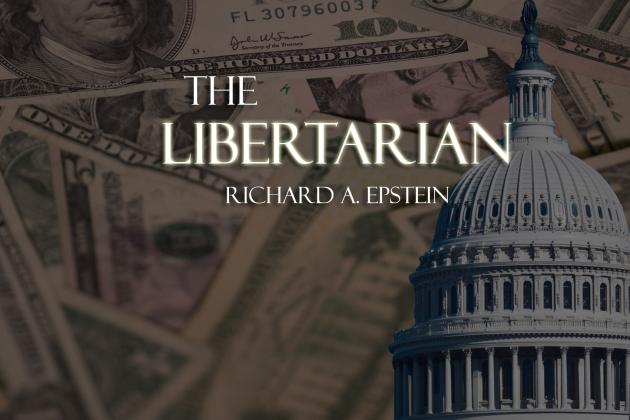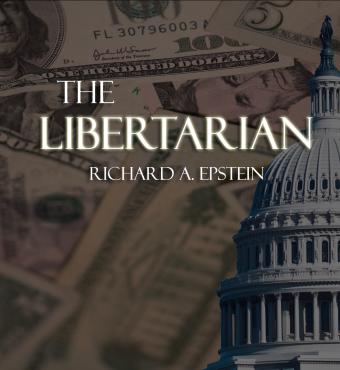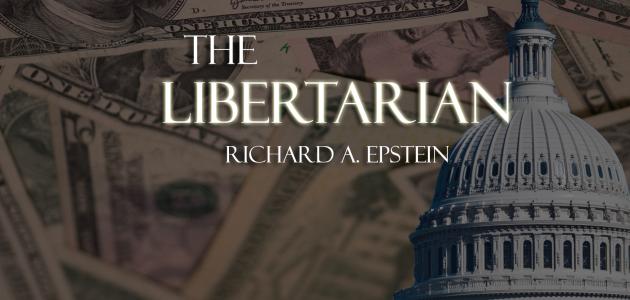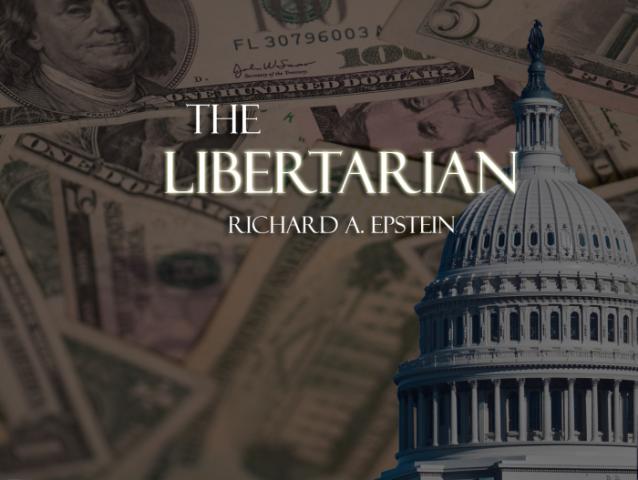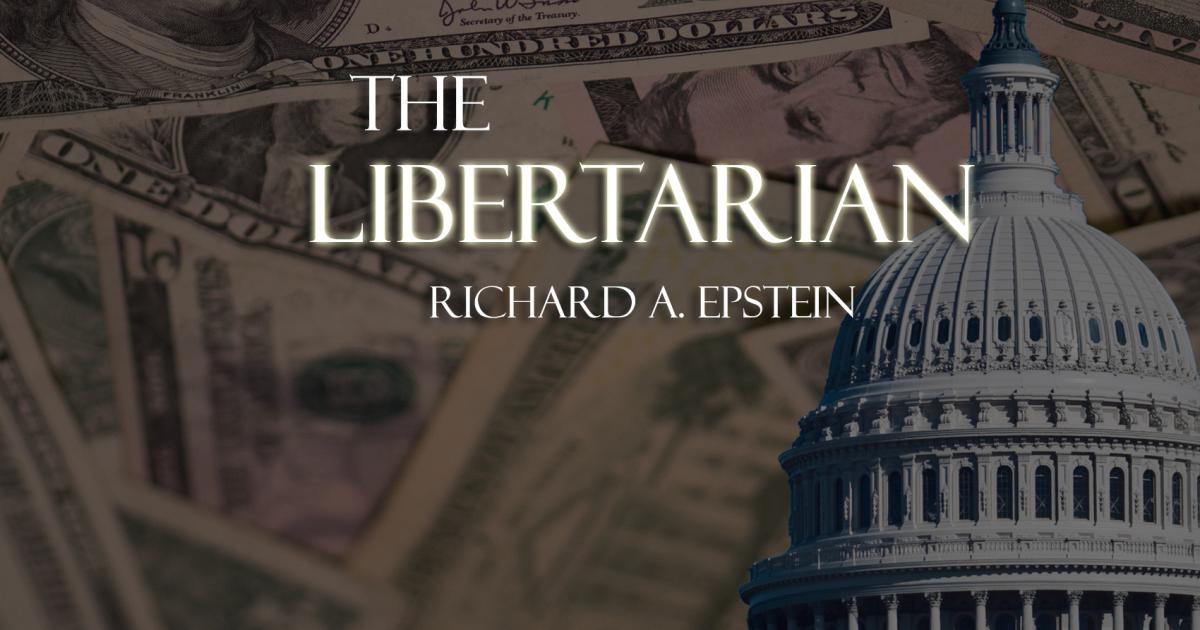Richard Epstein considers the consequences of the federal government defaulting on its debts, explains why attempts to use the 14th Amendment to circumvent Congress are misguided, and closes with a remembrance of the late (great) John Raisian.
>> Tom Church: This is the Libertarian Podcast from the Hoover Institution. I'm your host, Tom Church, and I'm joined by the libertarian professor Richard Epstein. Richard is the Peter and Kirsten Bedford senior fellow here at the Hoover Institution. He's the Lawrence A Tisch Professor of Law at NYU and is a senior lecturer at the University of Chicago.
And Richard, I'm here today to ask for your advice on what currency I should put my life savings into when the US defaults on its debts early next month. Should we go euro? Should we go renminbi? I don't know where we should head. I asked Richard because right now the President and Speaker McCarthy are in negotiations over the debt ceiling, right?
We officially did hit the debt ceiling earlier this year, but through extraordinary measures, the treasury department is able to pay off some bills. We're deferring costs for later. We'll pay them back, assuming we come to some sort of arrangement. So first of all, Richard, talk me through where the negotiations are right now.
One, why have a debt ceiling? And two, what do you think of President Biden's approach, or his ask that we just raise the debt ceiling, no conditions attached?
>> Richard Epstein: Well, I'm gonna answer your first question first. The answer is the uncertainty level is so high that you do under these conditions, what you always do, engage and extensive diversification of your assets.
Both across currencies and stocks across different countries and the less. What you do, in effect, is you could reduce the variance, but you will never be able to make sure that you're gonna be as good after this happens as before. When real wealth goes down, even if people train funny derivatives, if one guy wins, the other guy loses.
So it's the net decline in wealth which determines the social situation. Now, how do we get here? I think it's perfectly clear how it turns out. We got here. You go back or 60 years ago, and it turns out if you had a political map in which you had a left to right index on one of two indices, aggressiveness in foreign wars is less important, but still there.
And the other sort of thing is size of government is a rough proxy for liberal and conservative. You would see a very substantial overlap between Democrats and Republicans. There would be southern Democrats who would be conservative, liberal Republicans who would be liberal. And that meant that each of the political parties had to engage in a certain degree of internal compromise.
And so you get two compromised situations, and then they have to deal with each other. They could kind of work a deal. But the recent map, I think, is really quite different. It's a map in which every every Republican is more conservative than every Democrat, and every Democrat is more liberal than every single Republican.
So that just simply shows that you've got a gap and there's no overlap. But that picture is incomplete, because the size of the gap, I think, has systematically grown over time. So that the Republicans are on one side side and the Democrats are on the other side. So that's the first.
Then when you start coming to the way in which these negotiations go, what happens is there's a degree of resentment on both sides. The Democrats say, Congress passed this stuff, we have to make sure that the country does not fail. So therefore we have to have the clean bill.
What the Republicans say is Congress, ie a Democratic congress in a previous administration passed all of this stuff. We're a Republican Congress, or at least half of it, and we're trying to solve this and you won't let us solve it. And so what you want us to do is to put off these negotiations until we get the clean debt limit, then we'll have the negotiation.
And it turns out there are two rather different views of how it is you cut the debt. If you're a Republican, you treat the English language as more or less coherent. And what you say is it turns out that you try to lower the level of expenditures which will allow you to lower the level of taxes.
Which will allow you to increase the level of productivity and try to move back to the old Adam Smith program. Broad, flat taxes essentially are the way in which to improve the overall size of the economy. If you are a Democrat, what you believe is tax the rich and regulate them to death and then take all the money and throw it into social programs.
So the Democrats engage in a form of debt reduction which looks as follows, we will increase taxes by $100 billion, and then we will announce a series of spending cuts, or increases, which are $95 billion. So since we are raising more money in taxes and then we're spending an additional money, we can have a bigger government than we had before and still have debt reduction.
I regard that as sheer fantasy. Because it turns out that you start increasing the taxes, put the other regulations on, you'll never reach the revenue targets that you want. But you could always, by printing more money, reach the expenditure departments that you want. And so the Republican attitude is, what you wanna do is have a clean bill and then negotiate over the size of the increase of government afterwards.
It's lose for us on the first thing, it's lose for us on the second thing. The only way that we can be sure that the second negotiations are going to be in good faith is for you to do it right now. And if I were the Republicans, I would take the suggestion June 1 is an impossible deadline.
What maybe we ought to do is to say, well have an interim measure which will extend it to September 1st to give us a summer to work these kinds of things out. That is going to be most unappealing, I think, to the Democrats under these circumstances. Because they've already said in no uncertain terms that every single cut that the Republicans want to make.
Except perhaps in returning unspent COVID money or something like that, is something which we regard as utterly unacceptable. And so they are still keeping with their program of deficit reduction, surrounded by huge tax increases. Which, of course, is what happened in all the legislation that went the previous year when the Republicans could hold no house and the Democrats hold any.
So it turns out if you look at these things, each guy has an extremely strong incentive to keep to its particular position. And then the question, who's gonna blink first, this is a game of chicken. And what the Democrats will say is well, the Republicans could've passed the clean bill.
Now what the Republicans say, you could have signed the particular bill and done negotiations with us in good faith. A bilateral monopoly, use the labor analogy. You have to come to the table and understand what the other guys are. And it's not a good faith reduction if, in fact, you wanna increase the size of government and increase taxes.
You read the papers, the Wall Street Journal and the New York Times are good exemplars, and it's clear they're in different universes. Bill Gaustin, a sensible center leftist, I would kind of guess, well, I really don't think that we should do anything other than the clean debt removal.
Okay, he says that, and the comments of which there are zillions are saying, where was this man born? When was he born? What planet does he live on? And then you read the letters to the New York Times, and it's the same thing, only in reverse. So I think, in effect, the gap is very large.
That means that probably they will fix this in some way, but it's going to take very long. And I would say there's probably a 15 or 20% chance that they'll fail. And I may be being optimistic, but probability is usually supposed to be relative frequencies of common events.
But this is one-of-a-kind situation, so getting the estimate is very difficult.
>> Tom Church: Quickly, Richard, I want to talk through the proposals that the GOP has offered while they passed a bill which, of course, will not be taken up in the Senate or passed by President Obama. You mentioned pushing Obama.
>> Richard Epstein: Obama? Biden.
>> Tom Church: Sorry, Biden.
>> Richard Epstein: Well, good old memory lane.
>> Tom Church: Indeed, indeed. I feel like we had a few of these discussions back then, too. You mentioned passing, are pushing this off until this fall, when, by the way, we have to pass a budget this fall as well.
It seems like these same questions are going to come up with the GOP house, right? They're talking about blocking Student loan relief, that's in the budget. They're talking about adding work requirements for Medicaid recipients, and they're talking about discretionary budget cuts, right? Cutting costs and then holding growth to about 1% for discretionary budget.
>> Richard Epstein: I mean, on the expenditure side.
>> Tom Church: On the expenditure side, right, going forward. I mean, what do you think about those as negotiating positions? What do you think is likely to happen?
>> Richard Epstein: Well, I think the student loan thing may be solved for them. The Supreme Court may declare the program illegal, but I think that gives yet rise to yet another problem.
Biden is allowed to do all of this stuff because nobody has standing to stop it. Then the constitutional weakness which I have insisted upon for my entire professional career, that there is nobody who obviously has the power to stop Congress from enacting illegal, ultra vires legislation, will become enormous.
You'll recall that that was a real issue, and it's still a real issue in the student loan forgiveness program, who has standing. And the standing cases are really highly contrived, it's almost fictional. My guess is they'll find that somebody has standing, but this is going to raise exactly the same issue.
This is a situation that affects every american in the same way, and it's a disaster, right? Well, the disaster doesn't matter for the constitutional provision. The only thing you have to show to beat these guys is to say that nobody has a distinctive issue. And if everybody is affected equally, it turns out that nobody has standing.
So they're going to go scrounging their heads trying to figure out who it is that can challenge this thing. My guess is the Republicans and their ace lawyers have already been working on this. They're not gonna say what it is. I can't tell you what it is, cuz I think the whole episode is bizarre, that a program this large cannot be challenged.
Whereas if somebody loses $15 because the government decides to take it away, that $15 loss turns out to be an individual grievance for which you have unquestioned standing, and you only have to meet jurisdictional amounts in federal court if they're applicable, which is not always the case. The whole thing is therefore got this complete surrealistic tone about what it goes.
Then, of course, you have to get to the merits, right? And you've heard the 14th amendment bandied about with great fury. The real 14th Amendment in terms of traditional litigation has always been Article 1, which talks about naturalization, privileges and immunities, due process and equal protection. But the clause that's operative here is Section 4.
>> Tom Church: You have to explain this, though, because how could this be used? What's the argument for using this to be able to set the debt limit aside?
>> Richard Epstein: Okay, I will read you the clause, and I'll tell you what it is. It's the validity of the public debt of the United States, right?
Authorized by law, underlined, including debts incurred for the payments of pensions and bounties for services in the suppression of the insurrection or rebellion, shall not be questioned. Let's just leave it right there, all right? And it is quite obvious what they're trying to say is that these were very controversial expenditures, and we're gonna pay them.
Whereas when it comes to the expenditures made by the Southern states, we're not going to assume their particular debts, cuz they were in the insurrection or rebellion. It gives you some sense as to why this January 6th was not an insurrection or rebellion. The Civil War lasted four years, the insurrection, so-called, lasted three hours.
But the key words that you have to see in this is the validity of the public debt of the United States authorized by law. How do you authorize the debt in the United States? Well, it turns out that the usual rule for authorizing a debt is you have to get some warrant from the Congress in order to make an appropriation or to secure and to borrow some money.
I don't believe that the president can go out and say, you know what? I'm going to incur $1 billion of debt in peacetime, and that you have to do it, so they say, no, no, no. So I think it's perfectly clear that Congress can authorize a public debt which has no particular cap to it.
But I don't think if authorized by law has its usual context and separation of powers that the president can do the same thing. And so he has to go back to them. And even if he has a veto power, the veto power is not going to get him the authorization, because the House of Representatives run by Mr McCarthy is not going to yield to it.
So I think the argument is a dead loser. But what happens is, if you listen to the account, is they said that the validity of the public debt shall not be questioned anywhere else, right? They leave out those other words, but they have to explain why a debt is going to be valid if it's not sort of approved in the normal way, in which debts are generally created by the United States.
So I think the argument is a loser. But what everybody else does is they have kind of like, Laurence Tribe made this rather bizarre argument. He says, when Congress has decided to authorize certain programs, it impliedly has authorized the United States to have enough money to have. So what happens is authorized by implication, by law, but who is doing it?
There was no specific ruling on this thing. And at the time this thing was put forward, if you remember, now, everybody was in favor, had all these soothing words about how it was that this thing would pay for itself by protecting us from climate change and the like.
So I think the argument is, again, a dead loser. But if the standing argument failed and if the Supreme Court should be so inclined to accept the argument, it turns out there's a kind of a general proposition, which is the higher the stakes than the lunar, the proposition, the greater the chance that it might be accepted, because you can't count on what nine Supreme Court justices are going to do.
So I'll give you another sort of scenario. What it is, they go in, the court finds they have standing, and then what they will do is they will say, you know what? This is a political question, after all, look at the way they're debating. And then you'll have to go back to the Political Question Doctrine to see whether or not this, quote, unquote, to use the phrase in Baker v Carr from Justice Brennan, what it is an intelligible principle that allows it.
And the answer is, if it has to be authorized by law. You go back and you look to all the appropriation provisions in Article 1, where it turns out the Congress has a very active role, where usually the House has the whip hand, particularly on taxation issues. So I don't think it works.
But who am I to say that is when the stakes are so hard? If you take the professoriate right as a kind of an interest group of one kind or another, the politics are perfectly clear. I represent a skeptical group, which has a robust 5% of the academy.
The liberals probably have 75% of the academy, and there are a bunch of other people who are smart enough to run for cover and hope not to make a stand. So I think, in fact, the political case or the political odds for these bad arguments to win are stronger than the intellectual case behind.
It is the way in which I read the current situation. So I think there is much to be very worried about on both sides. Because this could be, in fact, a classic chicken game in which neither car veers off the road. And they head clash and destroy everybody, so that we would all say, it would have been better had the president yielded.
It would have been better had the Congress yielded. And then there'll be name pointing on what the rest of it is. But what's happening in the United States is the pressure of political expenditures are so great that what it's doing is about to rend this country into half.
And this is a consequence of sort of overplaying your hand. And in this particular case, we know who's over playing his hand. It's not McCarthy trying to get some modest cuts in the budget. It's Biden who wants to continue to expand, notwithstanding the fact that the ratio of the national debt to the GDP and all of the other indicators of sound currencies point in the opposite direction.
But they kind of Paul Krugman fans, never found an expenditure that I cannot cover with a bond debt or with a tax, right? And if you really start to believe all of that, you'll be right most of the time. And the one time you're wrong, it will be fatal.
>> Tom Church: Fair enough, two yes, no questions for you, Richard. Cuz I wanna just underline this 14th amendment question, cuz it's fascinating to me the argument they're making, someone would make with to look to the 14th Amendment to say we can sidestep Congress. Is that the Constitution now through this amendment says debts of the United States shall not be questioned, aka will always be met.
And if Congress won't do it, then the executive can step in and make sure that we fulfill the 14th Amendment, is that your argument? Okay.
>> Richard Epstein: Yeah, but it misses the words authorized by law.
>> Tom Church: Sure.
>> Richard Epstein: Now, their argument is, look, this is of a piece. Biden is a great believer in executive orders, right?
I mean, he basically has read the decision in West Virginia which says that you cannot hide huge programs in executive orders and says there's never gonna be a huge program again. So if you look at the recent initiative with respect to the automobiles and fossil fuels phase out, I guess the EPA guy, Regan, comes along and says, well, we've complied with the West Virginia holding.
They're not gonna say it doesn't apply, they're gonna say we've always done the requisite studies. And you know what, we really think we can take fossil fuels from about 80% of the total economy and 95% of the cause and reduce it to 10% of both in the matter of a decade.
And so we're gonna decree it right. Now my view is what you have to do is to understand that the debt limitation provision, the expansion of the administrative state through the Chevron doctrine, the extraordinary range and complexity of these executive orders is all of a piece. And the piece is, if the president doesn't like Congress, he just ignores them.
This is not a separation of powers doctrine, this is an evisceration of one part of the government. And it turns out there is no question that if you're trying to figure out what the relative strength of the branches of government did, basically, a very aggressive president, a very divided Congress, as this one surely is, a relatively passive judiciary, results in an enormous expansion of presidential power.
And that's exactly what's going on here. And if this thing takes off, essentially what will happen is going to be a very rough hole to take back to a smaller government, if it turns out that the president is a big spender. So you have two republican houses in Congress still gonna be a problem.
What's that? A loan forgiveness program of $500 billion is like a direct appropriation, save for the fact that you have no congressional authorization. Now, by the way, you left something out, I'll just mention it about shrinking the budget. We have a military which is in complete disrepair. I think that when I was terrible officials, I think Lloyd Austin and our attorney General Merrick Gal, running neck and neck with perhaps the worst, although Janet Yellen may be a close third.
But we cannot continue to spend how we're spending money on the military or the amounts that we're spending on the military, given the fact that there are flashpoints all around the globe at this particular point. Western Europe is probably on simmer. The Middle east is building up, and the stuff in the Taiwan Strait is getting greater.
And we can't beat our recruitment goals because of the asinine way in which the military runs its own program. So we have to reform that operation, have to increase the budget at the same time, and completely reorient the way in which we spend that money. So in addition to everything else about where we cut, the Republicans, many of them turn out to be like Rand Paul, they're kind of mini libertarian isolationists.
And they say, well, we'll defend our borders, but we don't want to go anywhere else. Well, that got you the Taliban hosting all the disruption in Afghanistan before 2000, and you'll see a reprieve of that again. There's no way the United States can withdraw from alliances with the rest of the world in which we have to put up a very large share of the money and the material and the moral force if we want to keep these forces out of control.
Right now, everybody's betting on the winners. And the winners turn out to be an unsavory combination of Russia, who's getting killed in Ukraine, Iran, which is surviving this, China, which may implode on its own stuff. But they are essential, a group of people who have no qualms, they push very, very hard, and everybody looks at the United States, and this is their attitude about the budget crisis.
These guys can't keep their soup together in any way, shape or form, and they are weak. They are ineffectual. The time for us to move is now. And any of you guys who are sitting on the fence be welcome to the fact that you could always back a loser by becoming an ally of the United States.
Western Europe, and the NATO alliance will not quite yield to that yet, although they're certainly shaking, but the rest of the world might. And so what's happened is you combine the domestic with the foreign policy, we're in a terrible pickle. And we have a president who's so oblivious of all the dangers that he's either created or not responded to that he's gonna continue to take this extremely hard line position, and he will have the majority of the american public to do it.
So if you're asking me a very crude question, who do I think is going to win the face down? I would say the odds are two to one in favor of the president, which I regard as a disaster.
>> Tom Church: Last yes or no question, and yes or no?
I'll ask for a short answer here, Richard. The government still gets tax revenue all the time. So imagine we get to, let's say it's June 1st around there and the extraordinary measures can't cover it anymore. And absent anything else, we actually would default on the debt, except for we still receive a lot of tax revenue and we could pay the interest on the debt that we've issued.
We would just maybe bounce checks to, I don't know, entitlement recipients or maybe on the military side or elsewhere. Does that still count as default in your book?
>> Richard Epstein: Of course it counts as a default. You'll default on some obligations, but not on others. Where the norm has always been, you paid them all off.
The hard question that you ask is which do you default on? And the political pressures, of course, will be default on all those abstract decks to become Argentina, right, and then renegotiate your failure. And the financial types who believe in a world order say those are the first debt you pay, and then you're going to hear people defaulting on Social Security payments, Medicare payments and everything else.
And the entire democratic project, the healthcare system and everything else that we have is going to start falling to pieces and so forth. They may make an exception for essential forces in the state. But remember, there's also a kind of a toppling effect here, which is if the federal government defaults on its obligations, it may have made commitments of one form or another to given states and locale.
They don't get the money, their own tax basis isn't large enough. And so what we do is we start seeing a default of union workers, for teachers, for unions, and for military people, not military people, cops and firemen and so forth. So there's nothing which says that when the federal government failed, the state governments will remain strong, many of them do have pretty good budgetary position surpluses, even when they have extravagant expenditures.
But these are very volatile, as you well know, because so much of it turns out to be capital gains on the super rich. And when the stock market tanks, California will go from a strong plus position to a strong we position in one year, following, as it were, the Dow and the general indices down.
So this is fraught with vast implications. And I have a pretty good sense of what some of them are. So I'm 10% confident that I got 10% of it right. But the rest of it's going to be even worse than everything we see.
>> Tom Church: Now, lastly, Richard, I actually wanted to end on a more personal note and talk about our friend John Raisian, who passed away late last month, because I really loved your column in divining ideas, remembering John.
I met John in 2010 when I came up to Hoover for a summer, and then he hired me back the next year full time and was just nothing but kind and supportive. So I'm hoping you'd leave us with just some words about John.
>> Richard Epstein: Every time I talk about it, it brings tears to my eyes.
I mean, I've had many great deans, and John was never my full time employer. But the one thing I so admired about him is he had a very clear vision of what he wanted Hoover to do and the kind of intellectuals he liked to bring to the place.
And what he always did is he made you feel more than welcome when he came to you. Because John's general vision of what it is is he wanted to bring people here. And he used to say it, whom I think are old enough so that I know they're internally motivated and they have enough independence of mind that they will do things that will survive me or surprise me.
But always wanted to put you in the best possible position, both internal to the institution and in terms of the public life. When I wrote the paper, one of the things I said was John was like Ed Sullivan, a reference which I Suspect many people today would not get.
But Ed Sullivan was a columnist for the New York Daily News. I think he had a stoop posture, he was utterly plastic. He was almost ashen in his face. He get on stage and he introduced somebody and they say, here come the Beatles. He lasted for 23 years, and that was like Raisian, because what he always did is he put the people whom he introduced first.
And so when you go on stage with John, you got this gentle little push, and it always made you feel that you were gonna do better, because not only did you want is please yourself, but you also wanted to please him. And he was always like that. He had a wonderful twinkle in his eye.
He had many complications in his own personal life that he always managed to overcome, but you could not find a finer friend or a better administrator than him. I mean, he raised Hoover. One story back in the 1980s when Glenn Campbell was the chairman. I didn't put this in the column.
I remember coming to Hoover and I realized I was in a kind of a fortified environment because Stanford was the enemy and he was gonna keep the walls hard. And I said, this is a very hard place to be with. And so I didn't think much of it.
And then ten years later, John calls me up and said, I'd like to have breakfast with you someday. And I said, my God. The change in the character of an institution by the change of a man was nothing short of extraordinary. So, I owe him an extraordinary debt for my own life, and I'm perfectly competent when I say there are many, many other people who are in Hoover who have been at Hoover and so forth have the same debt to him.
He's a force that will be very difficult for anybody to replicate, and he's somebody to which we should give thanks and gratitude and all best to his wife at this particular point. So I'm very much a fan of John Raisian.
>> Tom Church: I couldn't agree more, Richard. Well, you've been listening to the Libertarian podcast with Richard Epstein.
If you'd like to learn more, make sure to read Richard's column, the Libertarian, which we publish on definingideas@hoover.org. Now, if you found our conversation thought provoking or helpful or interesting, Please share it with your friends and rate the show on Apple Podcasts or wherever you're tuning in. For Richard Epstein, I'm Tom Church, we'll talk to you next time.
>> Speaker 5: This podcast is a production of the Hoover Institution, where we advance ideas that define a free society and improve the human condition. For more information about our work, or to listen to more of our podcasts or watch our videos, please visit hoover.org.







